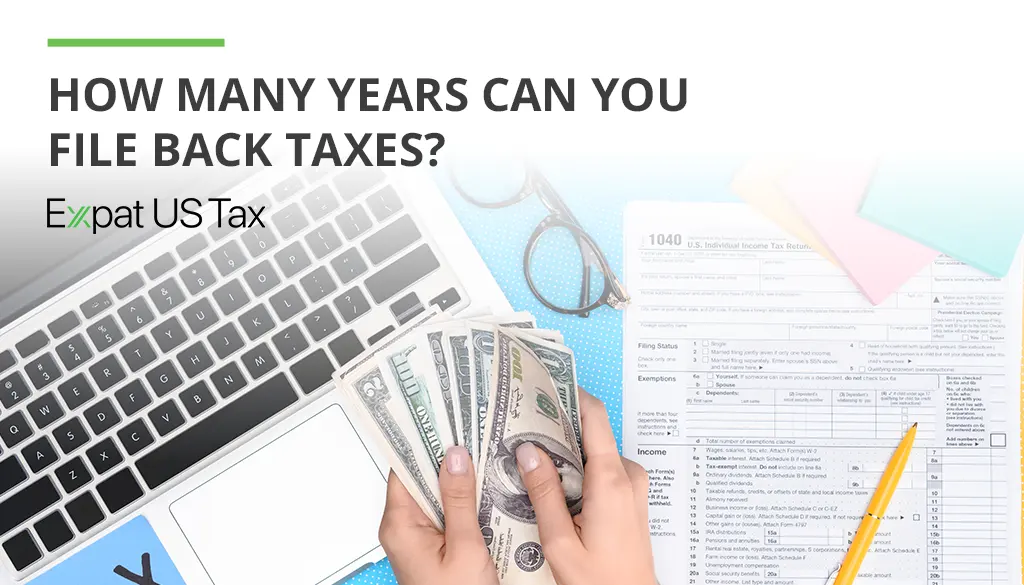How many years can you file back taxes?


Febb Borje, a tax professional with 11 years of expat tax experience, specializes in US tax preparation, tax planning, and tax advice for US citizens and Green Card holders living and working in Australia.
*30-minutes US$347.
Table of Contents
How many years back can you file back taxes and stay compliant?
You can file tax returns for any past year.
For US expats, it’s usually best to file at least the most recent six years of returns. The IRS generally views filing back six years as bringing your account into good standing. In most cases, this helps avoid audit triggers and shows you’re making things right.
If the IRS discovers that you underreported income by more than 25%, they may ask for returns going back six years to verify things. That’s because substantial omissions push the audit window further back to ensure nothing was missed.
Did you forget to file your Foreign Bank Account Report (FBAR) for six years? What about forgetting to file your taxes for three years? If so, then read our Streamlined Tax Amnesty article.
How far back can the IRS audit or collect taxes
The IRS normally has three years from the filing date, or the original due date if you filed late, to audit a return.
If they find you missed more than 25% of your gross income, the audit window extends to six years. Once it’s extended, they can review returns from that full period.
If you never filed a return for a given year, or if they believe there’s fraud, the IRS can audit or assess taxes at any time. There’s no time limit in those cases.
Once the tax is officially assessed, the IRS typically has 10 years from the assessment date to collect what you owe, including penalties and interest. After that, collection efforts generally stop unless you’ve taken actions that pause the clock, like filing bankruptcy or accepting an installment agreement.
Deadlines for claiming refunds and credits when filing back returns
If you’re due a tax refund or credits, like withholding or earned income credits, you must file a claim within the later of two deadlines:
- Three years from when you filed the original return, or
- Two years from when you paid the tax.
Whichever date is later applies. If you miss that window, any refund or credit you might have received goes to the US Treasury. Once that deadline passes, the refund disappears.

Bring your tax filings current with help from our experts.
Why you should file at least the last 6 years even if no tax is due
Even if you think you owe nothing, filing at least the most recent six years can be a smart move for several reasons:
- It helps avoid penalties and interest that can accumulate if tax was owed.
- It preserves Social Security credits, especially if you’re self-employed.
- It supports loan or mortgage applications, since lenders often ask for up to six years of tax returns.
Filing those years establishes compliance and makes financial or immigration-related matters smoother.
Penalties and interest for late or unfiled returns
If you’ve missed filing or paying taxes, the IRS charges both penalties and interest that add up quickly:
- Failure‑to‑file penalty: 5 percent of any unpaid tax per month or part of a month, up to a maximum of 25 percent. If your return is more than 60 days late, you also face a minimum penalty, which for recent years is around US$510, or up to 100 percent of the tax owed, whichever is smaller.
- Failure‑to‑pay penalty: 0.5 percent per month on unpaid tax, capped at 25 percent. If you miss filing and paying, both penalties apply, but the amount charged for failure to file is reduced by the failure-to-pay rate (so it’s typically 4.5 percent + 0.5 percent = 5 percent).
- Interest accrues separately on the entire unpaid balance (applying to the tax, penalties, and fees).
What to do if you need to file back taxes: a step-by-step guide
- Get your income records
Use IRS Form 4506‑T to request transcripts for up to 10 years. This helps you see what the IRS has on file and makes preparing returns easier. - Prepare past Form 1040s
Use the correct tax forms, schedules, rates, and deductions for each year you’re filing. - File returns and handle payment
You can e‑file where allowed or mail paper returns. If you owe tax, pay what you can or set up a payment plan with the IRS to minimize penalties. - Consider the Streamlined Filing Compliance Procedures
If you qualify as a non‑willful US expat, this IRS program lets you file the last three years of returns and six years of FBARs without failure penalties. You still owe tax and interest, but many penalties are waived.
Penalties and interest can skyrocket if you’re behind on US tax obligations. Filing the most recent six years of returns often keeps penalties limited and helps secure your compliance record. If eligible, the IRS streamlined program will help you clean up foreign reporting and missed filings without heavy penalties.
If you’re unsure of your next step, a US‑expat tax professional can guide you through the deadlines, eligibility, and filing process so you’re in control and avoid surprises.
FAQ'S
What happens if I haven’t filed US taxes for over 10 years?
The IRS can still come after you if you never filed, especially if you owe taxes or have foreign income. There’s no time limit in these cases, so it’s best to file as soon as possible to get back into compliance.
Can I go to jail for not filing my US tax return?
Will the IRS seize my foreign bank account if I haven’t filed taxes?
Do I need to file state taxes too if I live abroad?
Can the IRS take my passport if I owe back taxes?



